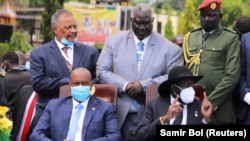It’s been four years since the April 2019, ousting of then-Sudanese president Omar al-Bashir; two since a short-lived power sharing agreement between two unlikely political entities and a subsequent military take-over; and things are finally beginning to look up in Sudan.
One of the first signs of positive movement was the beginning last April of the trial of Ali Muhammad Ali Abd-Al-Rahman, better known as Ali Kushayb. Ali Kushayb is alleged to have committed crimes against humanity and war crimes as a senior leader of the Janjaweed, a Sudanese government-aligned militia that used extreme brutality to help put down an uprising in Sudan’s Darfur province.
“This is a crucial moment for Sudan’s future,” said Mark Simonoff, a Legal Advisor for the U.S. Delegation to the United Nations. “This is a landmark case – the first trial against any senior leader for atrocities committed by the Omar al-Bashir regime and government-supported forces in Darfur and, more importantly, the first real opportunity for justice that victims of Darfur have had.”
Another sign of positive movement is the December 5 signing of the Framework Political Agreement. This accord between military rulers and civilian power is an essential first step toward re-establishing Sudan’s democratic transition, which began with the 2019 overthrow of the al-Bashir regime but came to a halt with the military take-over of the government in October 2021.
“This agreement, and the recent launch of Phase 2 dialogues on outstanding issues, are promising steps towards establishment of a final agreement to form a civilian government,” said Advisor Simonoff. “The fact that these negotiations have happened at all is a testament to the Sudanese women, men, and youth who have persistently and courageously taken to the streets to demand their rights and to call for civilian rule, despite facing violence at the hands of Sudanese security forces.”
Still, some of the hardest challenges lie ahead as the parties begin to negotiate some of the issues in these Phase 2 dialogues. This includes the Juba Peace Agreement, which stipulates that Sudan will be constructed as a federation, as well as the questions of transitional justice and security sector reform.
“Over the next few months,” said Mr. Simonoff, “we will continue to stand with the Sudanese people as they work to find common ground on how transitional justice, including accountability for the violence in many decades of conflict, can advance truth, justice, reconciliation, and healing.”






